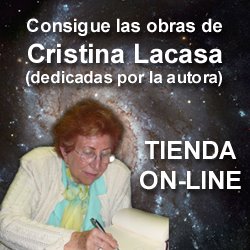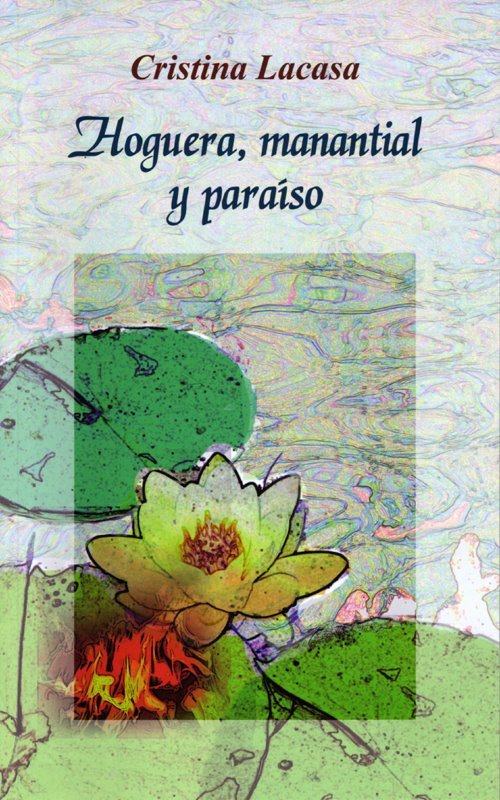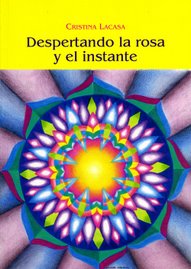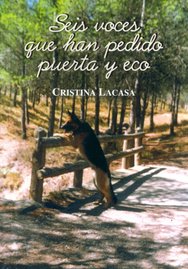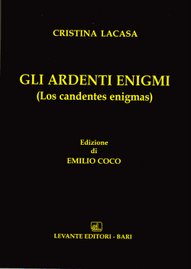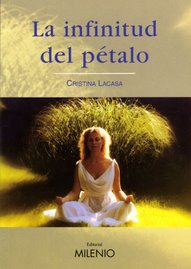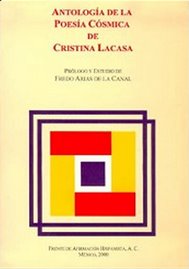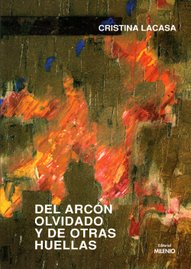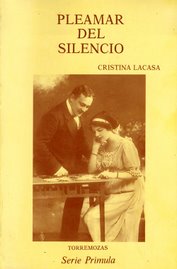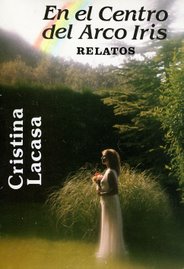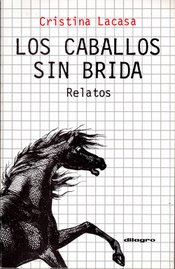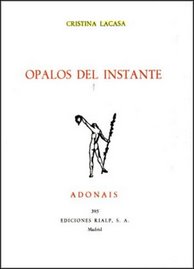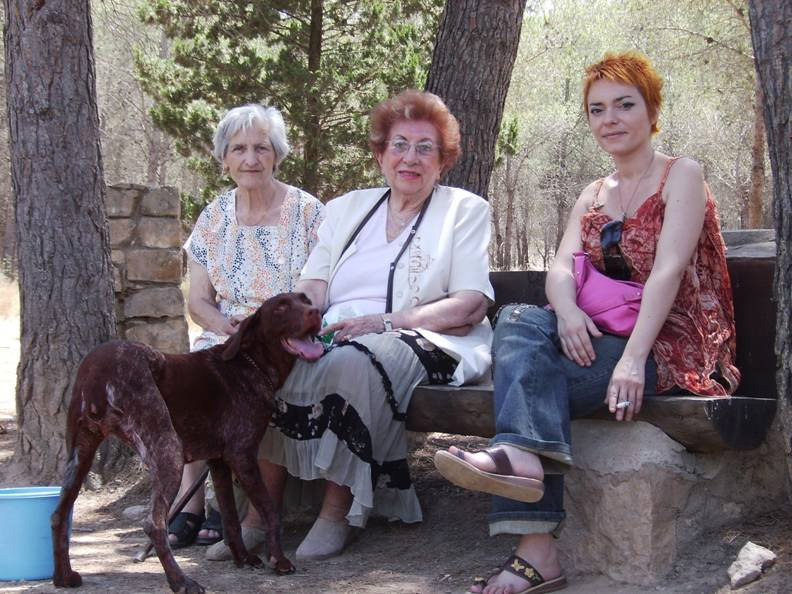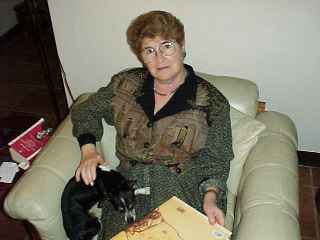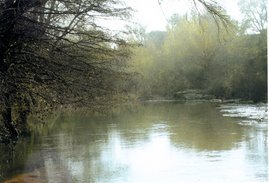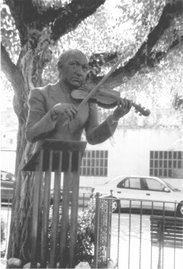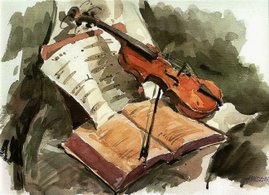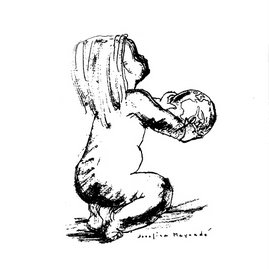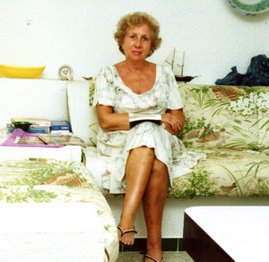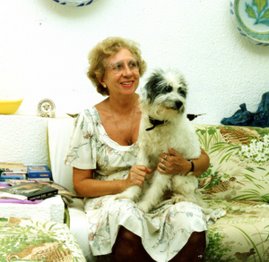 Portada de "THE FEMINIST ENCYCLOPEDIA OF SPANISH LITERATURE", editada por Janet Pérez y Maureen Ihrie, Greenwood Press, Westport, Connecticut, London en 2002 (Department of Romance Languages, Wake Forest University, North Carolina, EE.UU.).
Portada de "THE FEMINIST ENCYCLOPEDIA OF SPANISH LITERATURE", editada por Janet Pérez y Maureen Ihrie, Greenwood Press, Westport, Connecticut, London en 2002 (Department of Romance Languages, Wake Forest University, North Carolina, EE.UU.).
Lacasa, Cristina
A University of Barcelona graduate with a degree in psychology, Cristina Lacasa has published poetry collections and short stories, collaborated in journals and magazines, and been awarded several literary prizes. In “Mapa natal” (1964; Natal Map, from Con el sudor alzado [With Raised Sweat]) we learn that Lacasa was born under the sign of Taurus. Like the bull, Lacasa approaches life with pride and, like the bull, loses the battle against time and death. The allusion to immolation in the Taurus sign (as in the myth of Mithras and in the Spanish bullfight) is also suggested by the poet’s own name, Cristina (feminine form of Cristo or Christ), who as a woman wonders if her destiny may be to exchange Eve’s apple of the Fall for the rainbow of redemption. This early attention to the meaning of her name marks Lacasa’s poetry with a sense of mission.
Her early works such as La voz oculta (1953; The Hidden Voice) echo the Platonic view of romantic poets like Gustavo Adolfo *Becquer (1836—1870). For the young poet, the world, particularly as it encompasses modem technology and urbanization, is a space of confusion where she seeks the light of salvation in the sun, her “Platonic lover,” but is constantly disappointed because it is unreachable. When she looks into water for answers, its reflections frustrate her attempt to reach the light. As the seven stanzas of “Soy” (1 Exist) indicate, the speaker perceives herself as a minute, insignificant being with no control over her life. The four sections of Los brazos en estela (1958; Arms in Wake) trace the speaker’s personal and artistic journey, beginning with “The Lily,” symbolizing the purity of childhood, “The Quest,”“The Wound,” and “The Cross.” As her name Cristina signals, she models her womanly and poetic quest on Christ’s passion on the cross, where the lily joins the thorns of cruelty and Christ’s healing hands are punctured by nails. Lacasa’s poetic speaker views life and writing as balancing acts between life and death. The sense of Christian mission takes a social direction in Con el sudor alzado. Due to oppressive working conditions, the Eucharistic meaning of bread is lost because earning it implies the exploitation of human lives. While she champions social justice, the poet feels imprisoned within “the hermetic capsule of the letters.” However, she persists in her social denunciation. In the much denser and longer poems of Encender los olivos como lámparas (1969; Lighting Olive Trees Like Lamps), she opposes greedy capitalisrn and war while trying to establish what she calls “the structures for Harmony.”
In a later poetry collection, En un plural designio (1983; In a Plural Design), the speaker’s mission for peace and justice fuses with a cali to respect the world’s diversity. This book is dedicated to alI the children who do not enjoy the most essential human rights. The poems in Ramas de la esperanza (Poemas ecológicos) (1984; Branches of Hope [Ecological Poemsj) focus on ecology in a language that mixes baroque elements with terms from the sciences, astrology, and a sort of new-wave thinking. In Opalos del instante (1982; Opals of the lnstant), the speaker readdresses her concerns to the cosmic level, as was characteristic of her earlier poetry. Faced with temporal destruction, she concentrates on the instant as an “opal,” an iridescent, rainbowlike gem in which ah life-filled connotations of the Sun are represented. In her search for wholeness, she revisits her childhood, the paradisiacal moment when the eyes/lips open to the purity of all colors. The sea is perhaps the major presence in the speaker’s life, for the water’s constant movement replicates her tenacious hope that things will return, that nothing ends completely. The sensorial dialogue with the surrounding world filtered through the speaker’s heart finds a balance in her blood and tongue, that is, in her word. However, in this search for wholeness, the speaker, a middle-aged woman, realizes that her possibilities are limited. If in her earlier experience social repression reduced her voice to a “whisper,” her words now he protected among leaves of a book that almost no one will ever read. As she explains in ”The Poet,” she is “the” generic poet merely surviving in the Third World. While she would like to alleviate the suffering of the oppressed and open human horizons to other levels of existence, her voice is not heard because her paradigms do not conform to the rigid rules of the world. The poet lacks status in the socioeconomic world.
Pleamar del silencio (1990; Hightide of Silence) is dedicated to her parents. Vicente, the father, appears as the ultimate provider of safety and love, while María, the mother, is an all-sensorial creature in communion with surrounding nature. Identified mostly by her singing, the mother is the voice of nature, which the speaker wants to recapture. The meeting of both parents is seen as an epiphany, a confluence of two stars in the cosmos. Being TWO, her parents lived as ONE; hence, they represent the unity and wholeness that Lacasa has sought throughout her writings. See also Short Fiction by Women Writers: 1900—1975
Work by
- Antología poética 1953—1976. Lérida: Instituto de Estudios Ilerdenses, 1977.
- Los caballos sin brida. Lérida: Dilagro, 1981.
- En el centro del arco iris. Relatos. Lleida: Larrosa, 1986.
- En un plural designio. Cuenca: Col. El toro de barro, 1983.
- Jinetes sin caballo. Barcelona: Ambiro literario, 1979.
- Mientras crecen las aguas (Antología poética 1953— 1976). Lérida: Instituto de Estudios Ilerdenses, 1977.
- Opalos del instante. Madrid: Adonais, 1982.
- Pleamar del silencio. Madrid: Torremozas, 1990.
- Ramas de la esperanza (Poemas ecológicos). Lérida: Dilagro, 1984.
- Sin lastre en la cascada (Tres laderas de un pálpito). Lérida: Dilagro, 1995.
- El viaje. Málaga: Col. Corona del Sur, 1981.
Candelas Gala
 Portada de "THE FEMINIST ENCYCLOPEDIA OF SPANISH LITERATURE", editada por Janet Pérez y Maureen Ihrie, Greenwood Press, Westport, Connecticut, London en 2002 (Department of Romance Languages, Wake Forest University, North
Portada de "THE FEMINIST ENCYCLOPEDIA OF SPANISH LITERATURE", editada por Janet Pérez y Maureen Ihrie, Greenwood Press, Westport, Connecticut, London en 2002 (Department of Romance Languages, Wake Forest University, North 

